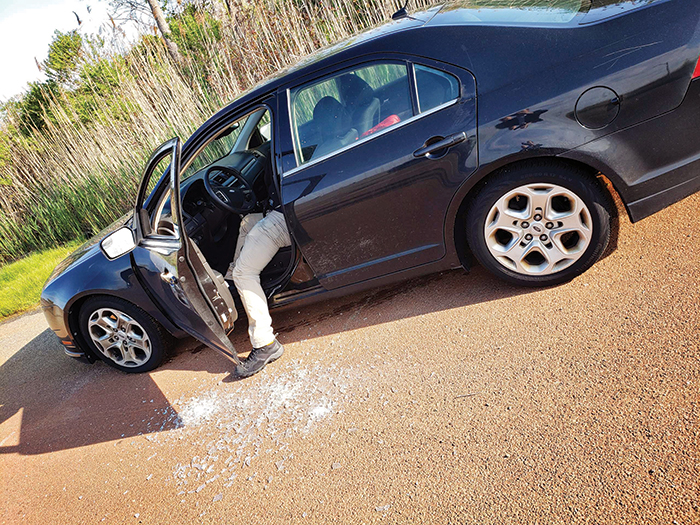Photo Courtesy of U.S. Attorney’s Office, Eastern District of New York
An FBI agent, posing as the hitman, sent a text message to DiRubba, which included a photograph of Carvalho appearing dead in his car, and a demand for an additional $3,000 to kill DiRubba’s daughter.
By Michael V. Cusenza
Disgraced former 106th Precinct Police Officer Valerie Cincinelli was sentenced on Friday to four years in federal prison after pleading guilty earlier this year to a single count of obstruction of justice in a wild case that saw her charged with scheming to employ a hitman to murder her estranged husband and the minor daughter of her boyfriend.
According to the original charging papers, an FBI investigation revealed that in 2019, Cincinelli demanded that her boyfriend, Howard Beach resident John DiRubba, hire a hitman to murder Cincinelli’s estranged husband, Isaiah Carvalho, Jr., and DiRubba’s then 14-year-old daughter, who resides in New Jersey.
DiRubba, 54, turned to the feds for help. Between February 2019 and the present, according to authorities, Cincinelli and DiRubba discussed the murder-for-hire plot both in person, as well as in communications over cell phones; some of said conversations were consensually recorded at the direction of FBI agents. During those conversations, Cincinelli allegedly made it known in no uncertain terms that she wanted Carvalho and the kid dead.
DiRubba told Cincinelli that he knew someone who would kill both of them for $7,000. According to prosecutors, on or about Feb. 18, Cincinelli made a cash withdrawal of $7,000 from a TD Bank branch in Wantagh, L.I., to pay “the hitman.” Bank records confirm the cash withdrawal. Then, Cincinelli gave $7,000 in cash DiRubba to give to the hitman in payment for the murders.
According to federal officials, at the direction of FBI agents, Cincinelli was notified in person at her home that Carvalho had been murdered. DiRubba was with Cincinelli at the time of the notification, outfitted with a recording device at the direction of law enforcement. Almost immediately after the Suffolk County detective left Oceanside, Cincinelli began to discussed her alibi—specifically, what she would tell the police if she were to be questioned about Carvalho’s death.
Then, around 35 minutes later, an FBI agent, posing as the hitman, sent a text message to DiRubba, which included a photograph of Carvalho appearing dead in his car, and a demand for an additional $3,000 to kill DiRubba’s daughter. In response, Cincinelli instructed her boyfriend to delete the text messages and photographs, citing her fear that law enforcement could subpoena the phone.
In the government’s sentencing memo, prosecutors requested that Cincinelli be sentenced to at least five years in prison. In the 15-page memo, prosecutors wrote that the evidence “makes clear that Cincinelli was, at all relevant times, an active and willing participant in the murder-for-hire scheme. And despite her numerous and repeated protestations to the contrary, responsibility for Cincinelli’s words and actions cannot lie with Dirubba, his daughter or Carvalho. It is the defendant’s voice on the recordings, concocting specific plans for the killings and elaborate alibis to throw her fellow police officers off her proverbial scent. It was the defendant who repeated for those officers a rehearsed explanation for Carvalho’s murder. It was the defendant who Googled the impact Carvalho’s murder would have on her pension. And it was the defendant who studied the comings and goings of Dirubba’s 13-year-old daughter on social media. It was the defendant who, in desperate effort to avoid arrest, destroyed incriminating evidence. Ultimately, it is the defendant—not Dirubba, Carvalho or anyone else—who must face the consequences.”

